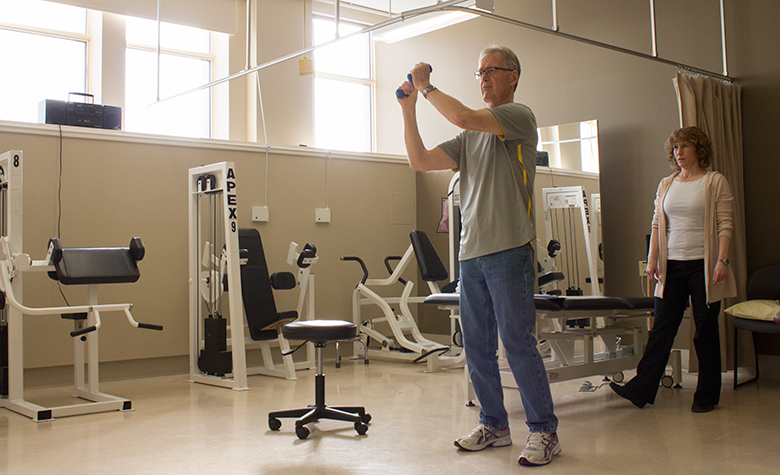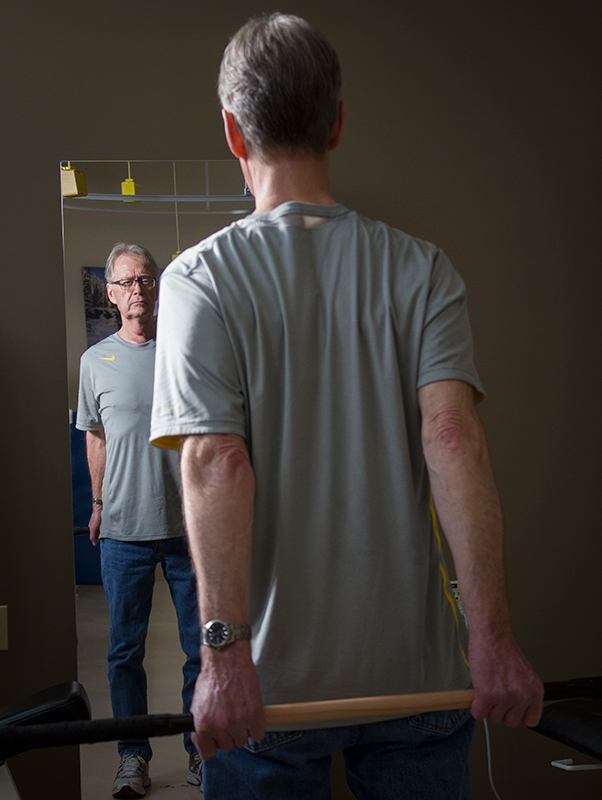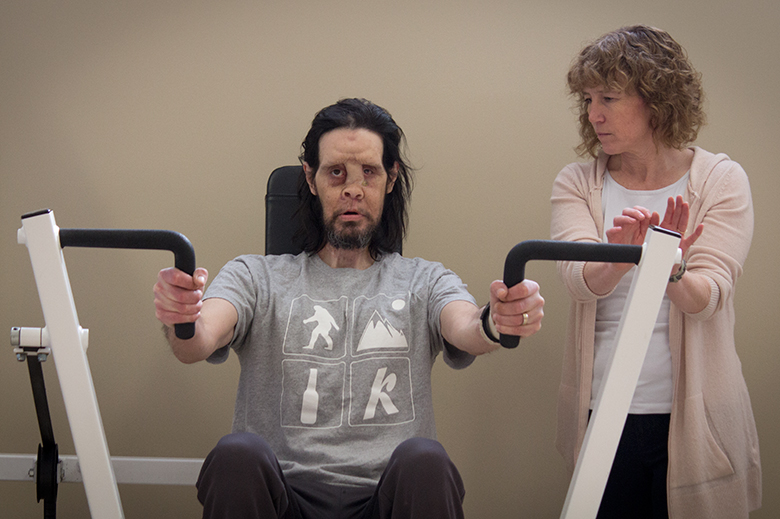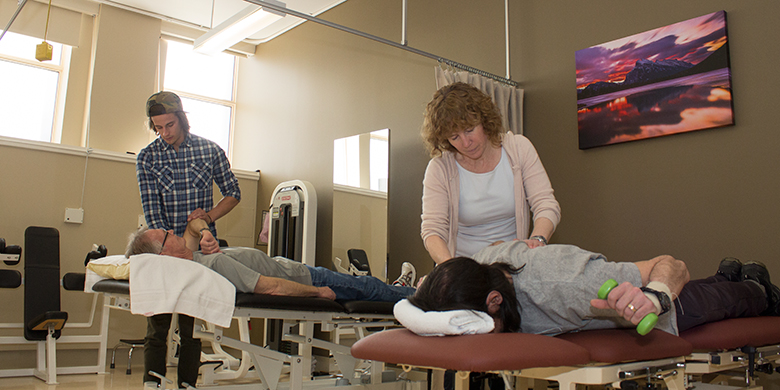
Cancer survivor Murray Lyle, 67, rehabs his shoulders under the supervision of U of A researcher Margaret McNeely inside the Cancer Rehabilitation Clinic in Corbett Hall. (Photos: Bryan Alary)
(Edmonton) It wasn't how Murray Lyle pictured the start of his golden years.
Instead of swinging golf clubs or working in his yard, the recently retired accountant has spent the last 15 months in and out of radiation and chemotherapy treatments. In late 2013, while shaving, he discovered a lump in his neck-a cancerous lesion that had spread from his tongue and tonsils, and required the partial removal of his lymph nodes.
Treatment went smoothly but not without cutting away at Lyle's energy and strength.
"I had no interest in eating. Everything tasted terrible or had no taste, and swallowing was difficult," remembers Lyle, 67, who at one point during his treatments lost a pound a day.
His road to recovery included 10 weeks of rehabilitation at the Cross Cancer Institute in Edmonton, but even with treatment Lyle "was a skeleton" of his former self, he said. Head and neck cancer surgeries often damage a nerve that helps with shoulder movement, and it left him unable to do basic tasks, let alone golf.
"I could hardly move my arm. It makes everything hard to do, reaching for clothes or even just putting on deodorant."
Fortunately, Lyle was referred to the Cancer Rehabilitation Clinic in the University of Alberta's Faculty of Rehabilitation Medicine. Under the care of Margaret McNeely, he has participated in one-hour rehabilitation sessions twice a week, part of a 10-week specialized shoulder rehabilitation program that incorporates weight training and cardio with a goal of slowly regaining his former strength.
"I could hardly move my arm. It makes everything hard to do, reaching for clothes or even just putting on deodorant." -Murray Lyle, cancer survivor
McNeely, an assistant professor of physical therapy who specializes in cancer rehabilitation research, has overseen the clinic since it opened in fall 2014. Its main focus is to provide space for clinical research studies in cancer rehabilitation. In McNeely's case, that means research for rehab related to breast cancer, lymphedema, and head and neck cancers.
"The rehabilitation we do here in the clinic is research or student learning-based," said McNeely, who also holds a clinical research appointment at the Cross. "The clinic is not a health-care service but it does indirectly provide some of what I'd call 'enhanced care programming' for those cancer survivors who have unique and complex issues and a very long recovery period."
McNeely's initial research in cancer rehabilitation showed that early intervention minimized the development of shoulder pain and stiffness-findings that led the Cross to create a successful clinical program designed to prevent painful "frozen shoulder."
More recently, her research has focused on the nerve and muscle recovery stage with the goal of improving function. It takes six to seven months before the nerve really starts to work again, and 18 months until it is fully recovered.
McNeely's work with the Cross Cancer Institute and now establishing the cancer rehabilitation clinic in Corbett Hall allows her to put the research into action, she said.
Bob Haennel, dean of the Faculty of Rehabilitation Medicine, points to the clinic as yet another example of the U of A's leadership in the rehabilitation sciences with the only free-standing rehabilitation medicine faculty in North America.
"Cancer rehabilitation is an important area of research where we feel our faculty can make a meaningful difference in people's lives and help them achieve their best," Haennel said. "The work we do in this clinic-research, teaching or one-on-one patient care-can do a lot of good for a lot of people who need rehabilitation to return to the activities they enjoy."
For Colin Holtner, the clinic represents a key stop in a nearly three-year road to recovery from surgeries to remove a golf-ball-sized tumour behind his optic nerve, all his lymph nodes and extensive facial reconstruction. Holtner is on his second 10-week session working with McNeely, hoping to eventually regain enough strength to return to work overseeing building maintenance for a 216-unit townhouse complex.
"Working with Margie will help me get back to work. My strength has increased 400 per cent since I started-it's not where I need to be but it's improving and my flexibility is up 10 per cent, too," Holtner says. "It's been a great improvement."
The clinic is only open a few hours a week, which McNeely would ultimately like to expand pending additional funding for research and programming. Ultimately, she hopes to see more emphasis provincewide for cancer rehabilitation programs and services.
"Even though we have a great deal of evidence showing the benefits of cancer rehabilitation and exercise, there's been a slow uptake clinically and in terms of programming that's available across Alberta," she says.
Given what is available in the community, Lyle also considers himself fortunate. He could have worked out on his own, but says he likely would have done too much too quickly and risked physical strain or injury.
"Plus, you feel inhibited about going to a gym in public when you look and feel like a skeleton of yourself," Lyle says. "My strength now, fatigue level-everything has gotten better since I started working with Margie."


